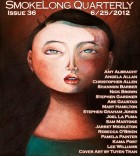When my grandmother was a young girl in Machva one of the fortune tellers predicted she would die a violent death, and this, like everything the fortune tellers predicted, my grandmother and her entire family took to heart, yet it did not as an outsider might assume cast a veil of dread and fear over any of their lives; instead, it was received as one might receive an unexpected gift of some importance: not only with the expected veneration and gratitude, but also with a sudden communal insight into the luck and significance of knowing one’s own fate, so that my grandmother, transformed by this prediction into something of an inamorata, was endowed with great presence when she six times a day walked back and forth the cobbled street between her home and my great-grandfather’s butcher shop where she worked: mopping the floor, receiving the orders, wrapping the cuts, balancing the accounts, and occasionally lifting her large dark eyes to meet those of the brooding young man with the scar on his cheek, who one day whispered under his breath in a strained and shaky voice that he was, in her presence, in great danger of forgetting how to breathe, and it seemed vital to everyone for obvious reasons that the two should marry as soon as possible and begin procreating, so this they did, and despite my grandmother living to see ninety-one and dying as she slept in the guest room of my townhouse, those of us who knew about the prediction still gave credence to it, as violence can be measured in all kinds of ways.
The Prediction

art by Marri Mooney


 The core workshop of SmokeLong Fitness is all in writing, so you can take part from anywhere at anytime. We are excited about creating a supportive, consistent and structured environment for flash writers to work on their craft in a community. We are thrilled and proud to say that our workshop participants have won, placed, or been listed in every major flash competition. Community works.
The core workshop of SmokeLong Fitness is all in writing, so you can take part from anywhere at anytime. We are excited about creating a supportive, consistent and structured environment for flash writers to work on their craft in a community. We are thrilled and proud to say that our workshop participants have won, placed, or been listed in every major flash competition. Community works.